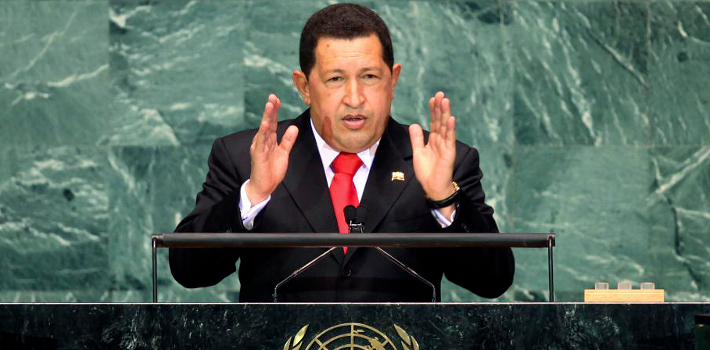
EspañolUnlike its failed attempt in 2006, it would not be surprising if this time around Venezuela does manage to gain a two-year seat and become a non-permanent member of the United Nations Security Council (UNSC).
It is worth recalling the speech the late Hugo Chávez delivered at the 16th General Assembly on September 19, 2005. He not only proposed changing the location of the UN headquarters, but also called for the expansion of the Security Council for both permanent and non-permanent members. He also demanded the reconstruction of the United Nations since, according to him, no amount of reform could change the organization.
Little by little, Venezuela has been able to gain the support of Latin-American governments, and the Latin American and Caribbean Group (GRULAC) recently approved Venezuela’s nomination to the Security Council, in place of Argentina.
The truth is, not a single Latin-American government objected to President Nicolás Maduro’s proposal.
GRULAC excused its heavily criticized unanimous support of a government that is visibly autocratic, violates human rights, and is increasingly involved in international narcoterrorism, by suggesting there was no other available candidate in the region. However, the truth is, not a single Latin-American government objected to President Nicolás Maduro’s proposal.
Even though a majority at the General Assembly could prevent Venezuela from taking a seat at the Security Council, since it requires the support of two-thirds of the 193 member nations, this is unlikely to happen.
According to Venezuela’s former UN representative Adolfo R. Taylhardat, “a good, strong campaign could prevent Venezuela’s nomination from being approved by two-thirds of the membership. This has happened in the past, and it happened when Venezuela was a candidate. At the time, however, there were two nominations from Latin America and neither received a two-thirds vote. So, the two original candidates were removed, and a third candidate was presented and approved. What I mean to say is that it is still possible to prevent Chavo-Madurismo from becoming part of the Security Council, but I recognize this is not an easy task.”
It is very likely that, beginning in 2015, we will see a representative of the Maduro government as a member of the most important body of the United Nations. In fact, his representative could very well be the daughter of the “supreme commander,” Gabriela Chávez, who was recently named Venezuela’s alternative representative to the United Nations. She has also been rumored as a potential presidential candidate for the 2018 elections in Venezuela.
Although they say otherwise and do nothing to prevent it, the United States and a number of other Western democracies are fearful of the Maduro government’s presence within this critically important international institution.
They know that the Castro regime is behind Maduro, and that Cuba and Venezuela do not simply form a bilateral alliance with ideological similarities. They constitute a marriage of forces with the ultimate goal of consolidating their neocommunist project in Latin America, euphemistically known as 21st-century socialism.
The United States and other Western powers are also well aware that the Bolivarian alliance seeks enough power and influence to destabilize and transform democratic states and their associated international institutions.
From the United Nations, the Bolivarian axis could make significant advances in expanding its influence beyond the American continent, especially in the Middle East and Asia.
Western democracies understand that Venezuela’s presence in the Security Council would elevate an ailing Castro-Chavista leadership in Latin America, along with its international profile. From the United Nations, the Bolivarian axis could make significant advances in expanding its influence beyond the American continent, especially in the Middle East, Asia, and the Islamic world in particular.
By making use of its recurring political polarization strategy, and its permissiveness with both anti-imperialist governments and diverse terrorist groups, Venezuela could deepen many of the very serious issues occurring around the world today. In doing so, it may very well deinstitutionalize the United Nations itself, as it is has done with Latin-American multilateral organizations, starting with the Organization of American States (OAS).
In the end, the presence of the Chavista government on the United Nations Security Council — and by extension, the Castro regime — will spell the end of the principles and norms of the UN charter, as well as the credibility and prestige of this world-governing body.
 Versión Español
Versión Español












